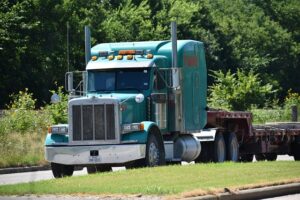Choosing the Right Trailer
The cost of a basic trailer – minus the cab – will cost you around $30K. That comes to about $0.25 cents per mile, or roughly 17% of your overall operating costs per vehicle. Whether you are an owner-operator or own a trucking company, it may be wise to diversify and pick up more business by having different types of trailers on hand for various jobs. Here are some of the most frequently used trailers and their specs, to help guide you in choosing the right trailer.
 Flatbed Trailer
Flatbed Trailer
Flatbeds are everywhere, and their popularity is due to their versatility. They are usually 48 feet long or 53 feet long with a steel frame and aluminum bed. Depending on the make and model, a flatbed trailer can carry anywhere 80,000 – 90,000 pounds. Truckers use flatbeds to haul everything from heavy construction materials to plants for landscaping, and even other vehicles. The open design makes them easy to load and unload, and they are ideal for hauling shipments that do not need protection from the elements.
Dry Van Trailers
Perhaps the next most common and popular trailer in service is the dry van trailer. When people think of trucks, they often picture the dry van trailer, which is fully-enclosed and weatherproofed to carry everything from furniture to clothing, and other merchandise that needs to be kept dry. Dry vans can carry loads ranging from 42,000 – 45,000 pounds, have a maximum length of 53 feet, a width of just over 8 feet, and a max ceiling of 8 feet. Note that dry van trailers do not have temperature control, so they are not ideal for food.
Refrigerated Trailers
Refrigerated trailers – or reefer trailers – have the same dimensions as the dry van trailer mentioned above. The difference in this case is a front-mounted refrigerated unit that can be set to temperatures ranging from about -22 – 80°F. Reefer trailers are used to transport everything from food and cosmetics to pharmaceuticals, and anything else that either has a limited shelf life or needs a regulated temperature during long trips.
Sidekit Trailers
Sidekit trailers are very much like regular flatbeds, but with paneling on the sides and a maximum weight of 45,000 pounds. Sidekit trailers are used for transporting loose but heavy materials, like dirt, gravel, landscaping rocks, and more.
Specialty Trailers
Specialty trailers, as the name implies, are used for very specific items – though the label is a catch-all for trailers that do not easily fit into other categories. Tanks used to transport hazardous materials are specialty trailers. Mobile kitchens used for conventions, trailers fitted with large advertisements, and others are used as mobile blood banks and similar medical services all fall under the heading of specialty trailers. Note that specialty trailers are set apart from others because they can carry over 200,000 pounds depending on their use.
Tank Trailers
Typically used by the petroleum and agricultural industries, tank trailers can be used to haul fuel, grain, plastic pellets for manufacturing, milk, pesticides, or highly specialized chemicals. Note that guidelines and regulations for tank trailers vary from state to state.
If you need working capital solutions to diversify your trailer selection, or if you are thinking about launching your own trucking company to haul different shipments, contact the team at Single Point Capital today.
Need help choosing the right equipment?
We answer all your questions when you sign up for our factoring services.
Click the button or fill out the form below.
[button color=”accent-color” hover_text_color_override=”#fff” size=”medium” url=”https://singlepointcapital.com/sign-up/” text=”Factoring Application HERE” color_override=””]
[gravityform id=”1″ title=”false” description=”false”]
